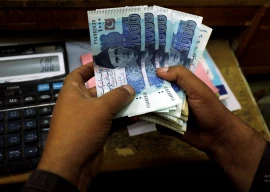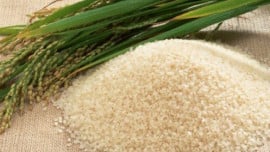
Despite orchards being adversely impacted by the mango malformation disease (MMD) in Sindh, farmers are confident that it will not hurt exports and ask the government to focus on increasing efficiency in fruit shipments.
“So far the mango crop has been fine,” remarked All Pakistan Fruit and Vegetable Exporters, Importers and Merchants Association (PFVA) Chairman Waheed Ahmed while talking to The Express Tribune.
Pakistan produces 1.7-1.8 million tons of mangoes every season and exports 5-7% of the produce, according to Sindh Abadgar Board (SAB) Senior Vice President Mahmood Nawaz Shah. Last year, mango exports stood at 120,000 tons.
Punjab produces 60% of the mangoes while Sindh’s share is around 38%. Some 2% of mangoes are produced by Khyber-Pakhtunkhwa.
“Therefore, if 10-12% of the crop is affected by MMD in Sindh, the overall exports should not take a hit,” Shah emphasised.
Read: Contagious crop disease plagues Sindh’s mango fields
However, he cautioned that the mango crop was facing threat from climate change and different pathogens.
One of them is MMD, which is a fungal disease in mango plants that can cause abnormal flower, leaf and shoot growth, and can severely stunt young plants.
Farmers have tried their best to eradicate this disease, but still some signs of the disease are found.
Shedding light on the cure from the disease, the SAB office-bearer said that apart from eliminating it, there was no cure for the malformation.
“We have taken preventive measures for fungal diseases, not curative; however, for this one we do not even know what preventive measures are,” Shah lamented.
The fungus gets even harder when the flower turns into unripe raw mango called Carrie.
Mango crop would be satisfactory in the upcoming season, remarked Federation of Pakistan Chambers of Commerce and Industry’s (FPCCI) Committee for Horticulture Exports former chief Ahmad Jawad.
“Out of the total annual production of mangoes in Pakistan, exports are always meagre,” he said in comments to The Express Tribune.
“Over the last 10 years, the maximum recorded export volume was 140,000 tons; we have not been able to enhance exports, which is unfortunate,” he added.
Increase in mango supply would not only benefit the exporters, but also the country as exports would fetch foreign exchange, he highlighted.
“I feel that Pakistani mangoes have the required potential and the Ministry of Commerce may initiate mango diplomacy and its dividends will be amazing.”
Shedding light on the challenges, Jawad pointed out that the country did not have ripening centres and processing units including hot water treatment (HWT) plants in mango production areas.
Read more: Traders lament low mango exports to US
“If we set up these facilities under public-private partnership, 70% of the produce will be shipped via sea route and export volumes will increase substantially,” he suggested.
Shah stated that due to Covid-19 international transport was restricted, which was why mango exporters opted for the land or air route, which was not feasible.
“Last year, the air freight was three times the normal air freight, which the exporters could not afford,” he said.
He asked the government authorities to step in to manage the situation as exports to low-end markets such as Afghanistan were easy, but “if we want to send our product to high-end destinations such as Europe we will have to struggle”.
“There are no facilities at our airports through which we can send our mangoes. Moreover, the airport authorities demand that we bring the fruit eight hours before the flight, but it hurts quality of the fruit due to high temperature.”
Published in The Express Tribune, April 18th, 2021.
Like Business on Facebook, follow @TribuneBiz on Twitter to stay informed and join in the conversation.






















COMMENTS
Comments are moderated and generally will be posted if they are on-topic and not abusive.
For more information, please see our Comments FAQ